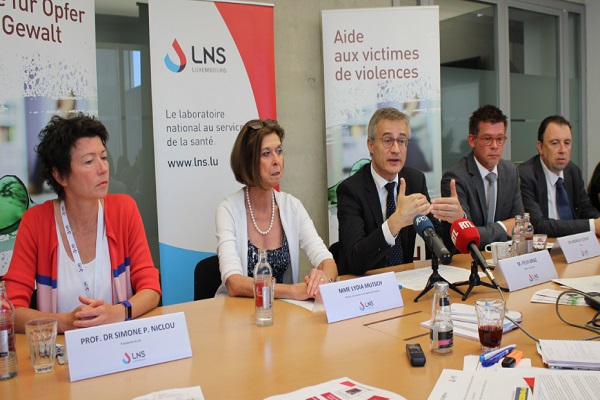 L-R: Prof. Simone Niclou, LNS president; Lydia Mutsch, Minister of Health and Equal Opportunities; Félix Braz, Minister of Justice; Dr. Andreas Schuff, forensic medical specialist; Dr. Claude Schummer, HRS Director General;
Credit: MSAN
L-R: Prof. Simone Niclou, LNS president; Lydia Mutsch, Minister of Health and Equal Opportunities; Félix Braz, Minister of Justice; Dr. Andreas Schuff, forensic medical specialist; Dr. Claude Schummer, HRS Director General;
Credit: MSAN
Today saw the official launch of the Forensic Documentation Unit for Violence (UMEDO) in Luxembourg.
On 19 July 2018, Luxembourg Minister of Justice Félix Braz and Minister of Health and Equal Opportunities Lydia Mutsch formally launched of the UMEDO, otherwise knownc as "Opferambulanz". The unit allows victims to have their wounds documented in order to one day take legal action if they so decide. As planned by the government programme, this service is implemented and offered by the National Health Laboratory (LNS) in close collaboration with partner clinics.
The concept of the UMEDO was developed jointly with representatives of the prosecutor's office, the police, the Ministry of Justice, the Ministry of Health, the Ministry of Equal Opportunities and the doctor-legislators from the National Laboratory of Health. This forensic documentation of injuries service is intended for adult victims of bodily and/or sexual violence, who initially do not wish to lodge a complaint. Only 5 to 10% of victims of violence decide to take steps with the prosecutor's office or the police. Many of them, including victims of domestic, sexual and gender-based violence, remain silent, often until it is too late.
The UMEDO service thus consists of establishing a medical documentation of visible injuries and recording biological traces so that the victim has this evidence at their disposal in the event of any subsequent legal proceedings. Since wounds heal and traces permanently fade, it is crucial to collect the evidence in a medical report as soon as possible after the incident especially in cases of sexual violence including rape.
The results of the examination and documentation of the evidence will be kept for 10 years by the National Health Laboratory, which corresponds to the statute of limitations for public prosecution for crimes. Their transmission to third parties requires a written agreement of the victim examined. The victim thus retains control over the documentation. After the consultation, the victim obtains a certificate of forensic documentation, but can also give it up for reasons of confidentiality or for their own protection.
The services of the Medico-Legal Unit for the Documentation of Violence are free for victims.








